#mostly because HER bringing it up as a problem just completely ruined my previously favorite moment with her
Explore tagged Tumblr posts
Text
I am taking note of every single villager who honestly suggests that Micah's half-monster status might have given his chosen bride cold feet and led to her running away and they are ALL dropping several positions in my internal character ranking.
#rune factory#rf3#so i chose raven in the end. i kind of hate it in that it feels so basic and predictable. she is THE favorite for this game#but unlike say forte i GET the hype for raven. her writing as a character and her relationship with micah was just too good.#that said i have every intention of having a second save for my other fave marian#especially after seeing that some people have unique dialogue for your missing bride. i NEED to know what marjorie will say#about her granddaughter going missing. also theoretically collette. dunno if anyone else will have anything unique#but anyway while she was far from the only person to allude to micah's half-monster form being the problem...#this post was primarily inspired by sakuya. who i felt personally betrayed by#mostly because HER bringing it up as a problem just completely ruined my previously favorite moment with her#i LIKED that she seemed okay that micah was half-monster and was just upset that he didn't trust her enough to tell her#but this one line completely justified it! if you hate/fear monsters enough at this point that even micah is still on the fence...#then he was RIGHT not to tell you and you had the AUDACITY to get upset that he hid it???#literally her having a problem with micah being half monster at this point took her from 3rd in my books to like.#bottom of the 'girls i actually considered marrying' tier. so like. 8 or 9th#especially considering literally yesterday in game i finished her requests.#she had JUST convinced her mom to let her work towards an inn that accepts humans AND monsters#honestly anyone expressing doubts about micah's bride not liking his half monster status post amity fair/unity festival...#feels a bit wrong and incongruous. but sakuya especially?#after completing all her requests? after the FUSS she had about micah not trusting her with his secret?#after she repeatedly used him just for his wool and partially convinced her mom through the logic of 'some monsters can be USEFUL'?#(as opposed to the monsters actually having like. intrinsic worth or rights)#it feels especially inconsistent and regressive. and i hate it
12 notes
·
View notes
Text
Steven Universe Graphic Novel Camp Pining Play (2019) - Outline & Review
The fourth original graphic novel for Steven Universe, Camp Pining Play, is a new story for the Lapis and Peridot fans, presented as a theatre project but focusing on relationships and emotional resolution more than anything. It’s new content–unlike some of the trade paperbacks that collect previously released individual issues of the comics. It is written by Nicole Mannino, with illustrations by Lisa Sterle and a cover by Francesca Perrone.
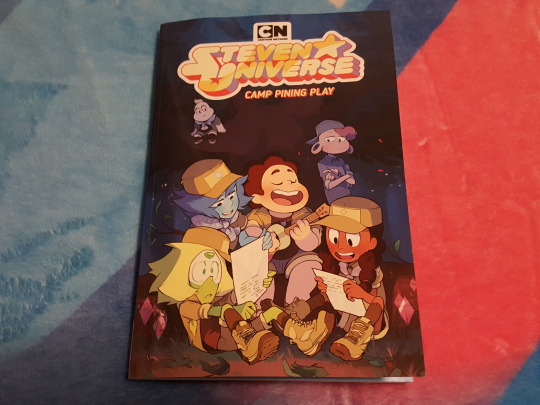
This graphic novel involves Peridot and Lapis falling in love with a piece of Camp Pining Hearts fanfiction--which turns out to have been secretly written by Lars--and after they get permission and have auditions, they put on a play that becomes ever more loosely based on the original fan work. Everyone involved seems to have input that takes the story farther from its origins, but they're determined to still present its heart . . . which becomes difficult when Lapis is uncomfortable with a central facet in the finale--a pretend fusion--but doesn't feel empowered to speak up about it even though Peridot keeps checking in with her. It's actually pretty nuanced throughout despite also having a lot of pretty superficial gags, and every character works pretty well as themselves on more than one level despite this being written by people outside the show team. As usual with my reviews, I'll discuss the story and then present a list of notable items.
(I’ve got to cut for length, sorry. Please look at the amazing sample panels under the cut even if you don’t want to read all my rambles about it.)
[SU Book and Comic Reviews]
The story:
Peridot and Lapis are reading and enjoying Camp Pining Hearts fanfiction, relishing the author's faithfulness to the show while featuring their favorite non-canon ship (Percy x Pierre). Lapis indulges Peridot's desire to hear her "Percy voice," and they praise the fanfiction while kicking around ideas of how it could become more real--like maybe it could be made into a real episode or an animated adaptation. Soon, though, they decide a play would be a great idea, though they would have to find the author and get their permission.

Using her homemade app Find-A-Clod, Peridot discovers the identity of the fanfic author, and who should it be but good old Lars Barriga--the local "Donut Butler," as Peridot calls him. Predictably, Lars first denies his authorship, then requests secrecy while admitting it. Sadie, it turns out, also knew of his hobby, and she's edited his work tirelessly all along. Lars gives his permission for them to put on a play (as long as he gets to critique it from the shadows and not have his name attached in any way), but now they have another problem: How do you even put on a play?
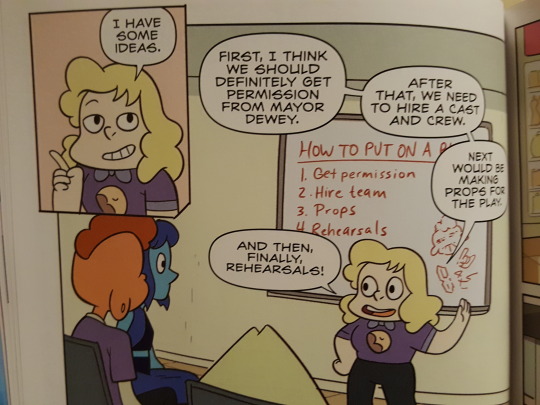
Sadie jumps into the organizing chair, giving suggestions worthy of Peridot's title "Donut Master." She comes up with a series of steps, manages to get Mayor Dewey's permission, and receives a one-week planning timeframe. They jump into auditions next, and though everyone's enthusiastic, no one seems too fixated on what roles they want to play (besides Amethyst, who really wants to be a shell necklace used as a prop). Steven, as the most handsome human Peridot knows, gets propositioned to play Pierre, and Pearl becomes Paulette. Lapis is elected to play Percy even though she doesn't think she's actually as cool as the character is.

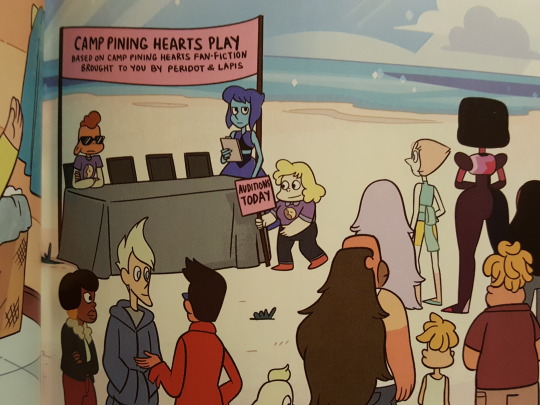
After the auditions, it's time for props. Lapis and Peridot make the actors create the props, though they soon find they need to give more direction or they'll get a bunch of junk they can't use. The sets and props become amalgams of what people can make and bring from home.

Finally, the rehearsals start. Everyone's struggling a little, from people who can't get their lines right to actors trying to destroy the props (well, Onion trying to destroy the props). But most of all, everyone seems to be awkwardly going through the motions, and Lars keeps shrieking "BOO!" because of how unlike his original story everything's going. Soon they come up with some ideas about making the presentation more their own so their characters won't be so awkward, and to help with the lack of chemistry between Percy (Lapis) and Pierre (Steven), Connie comes up with a unique idea. . . .

She suggests Lapis and Steven should fuse!
Well, that's a controversial statement. Peridot's against it because she thinks their actions are enough to show their affection and they don't need fusion, and Garnet is opposed to fusion as a stage trick. But Connie isn't suggesting it willy-nilly; she thinks they'll need something big to really emphasize the characters' connection, and Amethyst thinks it'd make them seem "strong." But then everyone has ideas on how to change the story or characters, and the core creators of the production are split on how to feel about it.

The blessing is given to include more personal interpretation into the characters. Most importantly, though, Peridot decrees that the fusion at the end needs to be a fake fusion. Lapis isn't up for fusion, though she refuses to say so and ruin everyone else's time. Peridot believes this is a good compromise, but Lapis is still nervous. She keeps it to herself and the rehearsals continue.

The day before opening night, Peridot and Lapis have a heart-to-heart, because Peridot can tell Lapis is holding back a bit. She finds herself unwilling to be specific about her issue, while Peridot goes on a bit about how fun it's been to find a good balance between following rules and enjoying some flexibility. Lapis claims she's just a little shy, and pretends she is okay with the fake fusion scene. She clearly feels like she doesn't have any business objecting since it's not real, and Peridot simply takes her word for it. They distract themselves by fooling around doing voices of the characters.
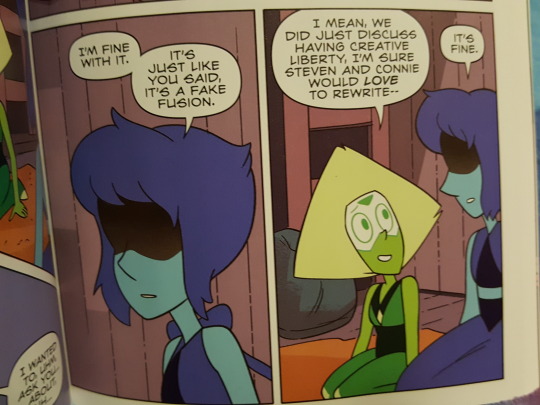
Opening Night arrives and the audience is full of Beach City residents as well as some visitors. Peridot makes a speech backstage thanking everyone for helping (even the people who don't want to be acknowledged, like Lars), and she emphasizes that she appreciates Lapis's partnership. It's a very sweet moment.
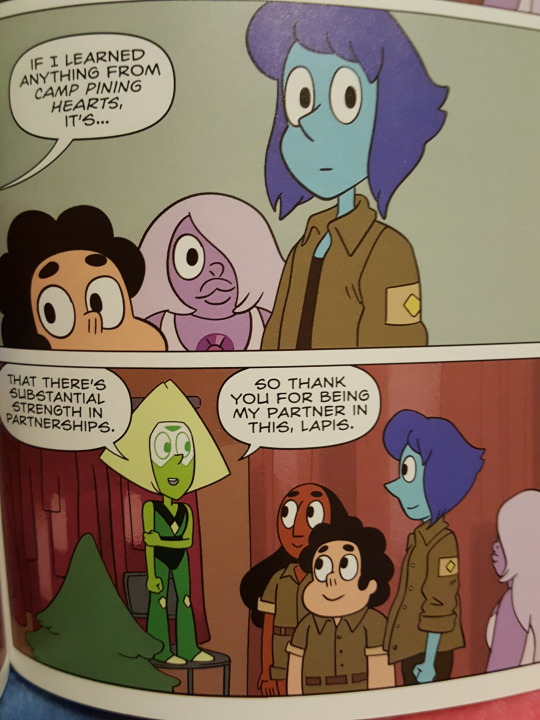
But as soon as everyone scurries off to their places, Lapis gets nervous. The beginning scenes go on as planned, but then Lapis stalls with her entrance because she's freezing. She can't think about anything except how she'll have to fake a fusion. Sadie, as a background tree, gives Lapis a pep talk, and then Onion shoves her onstage and she tries her best.

There are a few minor mishaps, but everyone mostly relaxes and carries out their roles. But then the climax occurs--Lapis's character Percy saves Steven's character Pierre from a dangerous lake after he's jumped in there to get Percy's special lost necklace. This is where they're supposed to have a moment and fake-fuse, but Lapis can't go through with even pretending. She lets loose what she's been feeling while on stage, forgetting about the play.



Peridot acknowledges that she knew about Lapis's discomfort with fusion, and she blames herself for approving the scene. But Lapis doesn't want Peridot to blame herself. She told Peridot that she was okay with it because she WANTED to be. It still didn't make her okay with it, though. And now she feels that she ruined the play through the very act of trying so hard not to ruin it for everyone else. But Peridot and Steven help Lapis understand that her feelings aren't irrational even though the fusion was "fake." Peridot only wants her to do it if she wants to do it.

With that, Peridot and Lapis embrace on the stage and exchange kind words, and then a smoke effect surrounds them. Some of the other actors get Steven, Peridot, and Lapis off the stage quickly and a pyramid of other actors assembles. Mr. Smiley and Greg begin playing a "Pierre and Percy Fusion" song, and the audience watches it blankly with little understanding, but Lars is emotional and clapping.


Finally the audience applauds, Lapis takes her bows, and everyone is grateful for the lessons learned and the wonderful experience. The End.
Notable:
1. The only Camp Pining Hearts characters whose faces have been shown on the TV show are Percy and Paulette. Pierre is mentioned frequently--since Peridot ships him with Percy--but we never see what he looks like. So it's pretty cool that the artists chose not to take artistic license with his appearance and drew depictions of him in shadow.
2. Peridot's analysis of why some fanfiction is better than other fanfiction--notably, that they fulfill the desires of the readers to see ships completed while still feeling like an episode of the show--was pretty spot on!
3. The fanfiction author--Lars--uses the handle xx54d4nd10ne1yxx. Even if it's private, I'm surprised Lars would use something that translates to "sad and lonely."
4. This graphic novel probably spends the most time outside Steven's perspective that I've ever seen; Steven is only marginally in the story, and we're used to seeing things from his perspective. This is quite a departure.
5. Peridot's app, "Find-A-Clod," was so unexpectedly funny to me that I almost choked on my sandwich.

6. As Dewey is still Mayor, Lars is not pink, and Sadie is still working at the Big Donut, we can assume this takes place before the episode "The Good Lars." That feels a little weird now, considering this book is fourth in the series of graphic novels and the one that came before it (The Ultimate Dough-Down) used Sadie's departure and Lars's space adventure as a plot point.
7. Lapis's negativity manifests in this comic as insecurity and frequent naysaying/pessimism. I thought it was really well done because it wasn't obnoxiously presented--as in, it felt genuine and appropriate for someone with her past and personality, not tacked on as her defining personality trait. You could really see her trying to have fun and not be the group's spoilsport, and you could tell she really felt those things.
8. Sadie says she's happy as a background character and that's kind of meta.
9. The shipping is strong in this thing. Peridot encouraging Lapis, the two of them solidifying their relationship, and the adorable compliments are so much fun. The Lapidot shippers have received their piece of heaven.
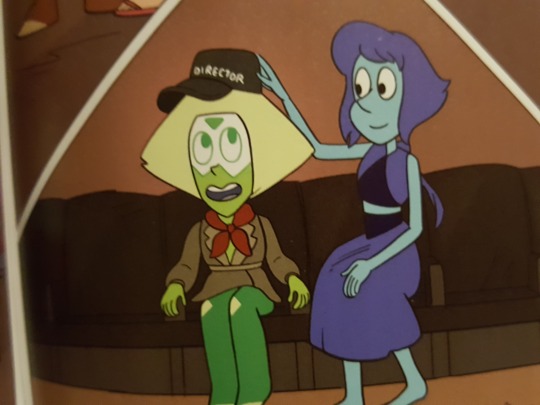
10. I couldn't get enough of Sadie obliquely insulting Lars when he acted like it was obvious he would take the "handsome guy" role if he didn't want to stay in the shadows. Sadie's like, "Oh, I vote for Steven."
11. Mr. Smiley and Greg are musicians for the play. I think that's cute, because we've seen Mr. Smiley as an out-of-work actor/R&B singer in the show. (And obviously Greg's an old rock star.)
12. New characters for Camp Pining Hearts have been invented: namely, Penelope and Parker, played by Connie and Onion, respectively.
13. Peridot is weirdly mean and disrespectful to Amethyst in this story? It seems to really come from nowhere. First she reluctantly lets Amethyst audition and grants her that she guesses she does have some talent after all, and then later when Amethyst comes in to impersonate a prop and "save the day," Peridot first voices her suspicion that Amethyst will not actually make anything better. It's weird; if you didn't watch the show, you'd think they had an ongoing rivalry or hated each other (or at least that Peridot disliked Amethyst). Hmm.

14. The central conflict of the book's story is impossible to understand or interpret without a very good understanding of the show. The book does not explain what fusion is at all (though obviously in a stage play as a symbol for a fraught scene for an actor, it represents having to kiss on stage). It also gives absolutely no mention of why Lapis has trauma surrounding fusion. If someone were trying to read this without the show's context, they might think there was some kind of awkward past or bad feeling between Lapis and Steven, since she's acting reluctant to pretend to carry out a gesture of affection with him. And even though Lapis's past with Jasper is mentioned--by name!--on the back cover, Jasper is literally not mentioned in the book anywhere. As a fan I had no trouble understanding the source of her angst, but because of this pretty important detail, the book can't be enjoyed on its own without seeing several specific episodes of the show.
15. There are some fun Easter Eggs in the crowd scenes. Play attendees include Mr. Frowney, Mr. and Mrs. Barriga, Dr. and Mr. Maheswaran, Mayor Dewey, Yellowtail and Vidalia, Nanefua and Kofi and Kiki Pizza, Barb, Mr. Fryman, and what look look some extras. All the known characters are family or the actors . . . except Mr. Frowney. Does that imply what I think it does about Mr. Frowney and Mr. Smiley? Hey, maybe they’re married now. :)
16. Lapis's speech where she emphasizes that she consented to the scene was powerful. She WANTED to be okay with pretending to fuse, but in the end, she wasn't. There are so many real-life scenarios that parallel this--when someone tries to downplay their own feelings because they feel like they're the odd person out and they will wreck others' good time if they express how they feel. But, as said in the comic, nobody there wants you to do that, and you not enjoying yourself makes it a worse time for everyone else too. Your real friends won't make you pretend.
17. You probably never thought you’d see Garnet in a squirrel costume. You thought wrong.
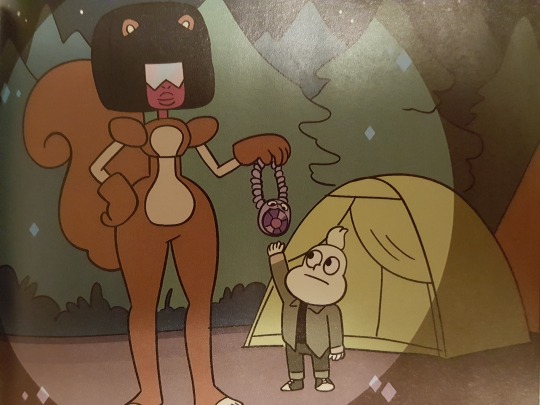
18. These two are too precious for words when they hug at the end of the play.

[SU Book and Comic Reviews]
#steven universe#camp pining play#camp pining hearts#lapidot#steven universe comics#su comics#myblog
156 notes
·
View notes
Text
Final Fantasy XII: A Retrospective Review
So, I received Final Fantasy XII: The Zodiac Age for Christmas last year.
Anyone who knows me knows that I am a huge fan of the Final Fantasy franchise. I have played almost every game with that title that has been released…at least the ones released in America, since I sadly do not speak Japanese. So it’s not unreasonable to assume I would want a remake of one of its games. I have quite a few, in fact, including V and VI on my iPhone, III and IV on my DS, and I and II on my PSP. Final Fantasy IX was the first game I put on my PS4 when I got it (yeah, I admit I put a PS1 game on my PS4 before anything else) and I thoroughly enjoyed replaying VIII when its remaster came out last September.
Final Fantasy XII, however, is a bit of an exception because, my Internet friends, I have a confession to make: Final Fantasy XII is my least favorite in the franchise.
Now I wouldn’t say that FFXII is a bad game. Far from it. It’s a very good game. For the most part, I completely understand why so many people love it. I just don’t feel the same way.
When I first played the game when it was released, I was not too thrilled with a lot of the gameplay decisions and where it ended up going story-wise. At the time, I concluded that while it was a good game, it was a poor Final Fantasy title. And this is taking into account the fact that I had played and beaten both Final Fantasy Tactics and Tactics Advance several times before playing FFXII. Both of these games are quite different from the main FF series, but are great in their own right. I basically consider the Ivalice Alliance as a separate spin-off series, sort of like the Crystal Chronicles games or the Dissidia series.
But FFXII was not that great, in my opinion. I didn’t feel invested in the characters, I was not a fan of the combat or license board system at all, and I felt the story was incomplete at best and annoyingly vague at worst. There were a lot of missed opportunities for the use of the characters. I was neutral about the graphics, which, although beautiful, I felt did not really improve on what was presented in Final Fantasy X, and I didn’t like that a lot of the regular trends known in the previous installments (the summons being the main example that comes to mind) were thrown out for something completely disconnected. I finished the game just feeling a mix of boredom and irritation, to be perfectly honest. The only thing I can recall even remotely liking was the music, despite it not being composed by Nobuo Uematsu, my favorite composer of all time even to this day.
Needless to say, playing The Zodiac Age was not on my list of priorities, and I’m not sure I ever would have played it had it not been gifted to me.
All that said, I received the game and felt that, well, maybe since I have it anyway I would give it another shot. Let’s see if FFXII is as bad as I remember. Maybe a retrospective review would be a good thing to post on the twelfth anniversary of the game’s original release, so why not?
* Looks at the dates and realizes Final Fantasy XII was originally released 14 years ago, not 12. *
Uh, never mind. Clearly I’m way too late for that party.
Anyway, as I started playing, I decided that there were two big questions that I wanted to answer with this retrospective review:
1.) Is Final Fantasy XII as bad of a game as I remember it being when it was first released?
2.) Would I change my claim about Final Fantasy XII being my least favorite game in the franchise?
Obviously the game has been out for a long time, remake or not, but I want to warn against spoilers here just in case. I don’t want to ruin anyone’s experience after all. With that, let’s get started.
Statistics
I just wanted to start this review with a few facts about my playthroughs (yes, the plural is intentional).
I played through The Zodiac Age twice, once for about 42 hours in length and the second for about 47. I used each of the jobs in the zodiac job system in each playthrough, but in different combinations and on different characters. Of course, I couldn’t account for every possible combination. That would take a very long time…
The party was at level 46 on my shorter playthrough and 51 on my longer one. I did not complete all of the hunts, although I fought more of them the second time through. I did not try to get any of the special gear like the Zodiac Spear, mostly because I don’t know how. I also did not get all of the espers, because other than the required time you have to summon Belias to get into Giruvegan, I never used summoning.
I avoided any guides or other playthroughs for the game, relying on the game’s directions and my memory from my previous plays…fourteen years ago…to guide me through the main part of the story. Yeah, I haven’t played FFXII since it was released in 2006, maybe 2007, give or take a few months. So, if I got confused or lost during the course of the game, it was because I either missed directions or the game was not clear on where I needed to go.
At the time of this review, I have not experimented at all with Trial Mode or played through New Game Plus.
Graphics
This section will be short, since I don’t have a lot to say about it.
The graphics are very good. As I stated above, in the original I did not feel the graphics were all that different than Final Fantasy X released four years prior, and my opinion of The Zodiac Age hasn’t really changed. According to the Final Fantasy Wiki, the game was given “high resolution upgrades to backgrounds, character models, 2d parts, and movie scenes.” To be honest, I didn’t notice much of a difference, although that might be because I didn’t play the game often enough to have the original graphics etched in my memory.
However, that does not mean the game looks bad. On the contrary, it is still a beautiful game, despite a few small glitches such as Balthier’s dialogue not syncing up to his lip movements or Basch’s hair not moving, Those are minor nitpicks. The game is still lovely to look at.
Sound and Music
Again, the music for this game is excellent. As I mentioned before, the music was probably the one thing I would praise about the game when it was originally released. The Zodiac Age somehow manages to make it better by providing a rerecorded soundtrack that makes a lot of the notes sound less harsh. There is the option of switching it back to the original version, but I preferred the new one. Basically they took the one thing I liked about the original game and made it better.
The voice acting I am pretty neutral about. For the most part, I don’t think anyone’s voice work was either bad or good. Other than the overuse of sighs, of which I get most annoyed by Ashe’s because she sighs all the time, I don’t mind the voice acting very much.
The only one I have a problem with, and this was also the case when I first played FFXII, is with Fran’s voice. I always feel bad criticizing a voice actor because they put a lot of training and passion into their work, but I just can’t help but be really annoyed at the choices SquareEnix made when casting Fran. She sounds so different in the English version compared to the Japanese one, and I don’t think it fits the character at all. Viera, all viera, are supposed to be these rather ethereal beings akin to the elves in The Lord of the Rings. So why, then, would the translation team have Fran be given a voice that makes her sound like a nasally four-year-old? According to the Wiki, the translators wanted to “sell the new take on the viera,” but it just falls flat.
Miscellaneous Gameplay
Okay, I only made this section so I can briefly go over some of the extra gameplay components the game has, both old and new. First, the good.
The high-speed mode is great. I always thought the characters moved so annoyingly slow! This fixes that problem and honestly saves a lot of time. I feel like it sheared off a couple of hours off the game that are just empty time needed simply to move from place to place. I used this in the FFVIII remaster as well for the same reason. I basically never turned it off. It didn’t affect cutscenes, so that wasn’t a problem. Also, the sound effect of four people running in high-speed mode is strangely hilarious to me.
There is a transparent overlay map now available. I find this to be much more useful than the minimap alone, which was constantly moving and incapable of helping me orient myself. Previously, I was frequently frustrated and getting lost in pretty much every area, dungeon and town when I played the original version. The overlay map was especially useful in places where direction was important, like the part in the Tomb of Raithwall where you need to turn the statues to face the blade. I could never tell which way to turn them and needed to bring up the main map over and over and over again. The overlay map resolves makes this and general navigation much easier.
My only complaint is that, although it is transparent, it does take up a lot of the center of the screen, but that is a small price to pay for the relief of so much frustration. There are times when the overlay map isn’t useable, namely in parts of Giruvegan and the Bahamut, and then the frustration rises again, which only emphasizes how nice the overlap map is the other times.
Autosave feature. Need I say more? Thank you, SquareEnix, for an autosave feature! Especially during some of the hunts.
And now the bad, which can be lumped into one thing: minigames. Or I guess they’re minigames. They’re small quests that are required to further the story that are not combat based. The yell at the guards to make them move game while stealing the Dusk Shard, AKA the dumbest guards ever. The have Vaan declare he’s Basch in front of people in Bhujerba to get the Resistance’s attention, which unless you had already played the game you don’t know to do in front of the guides, leading you to just listening to Vaan spout annoying nonsense while literally nobody listens. The exchanging information quest in Archadia to get chops to be allowed to ride a flying taxi, which is only slightly less annoying this time around because they reduced the number of exchanges you need to do from nine to three. I guess they realized how tedious it was. I disliked all of these when I first played the game and they were superfluous and dumb and add nothing to the experience this time around too.
Character Progression and Combat
Now we get to the parts where I feel I can really say something constructive. I was initially going to have these be separate sections, but they are so closely related to one another that it seemed silly to split them.
There is something I want to make perfectly clear, that I must admit came very much to my surprise: The combat in The Zodiac Age is nowhere near as bad as I felt it was when I played the vanilla game. Before it felt like a boring slog just to get from one quest to another, but I found that not to be the case this time around. I think the changes to the license board helps with the combat be more dynamic and require a bit more strategy since not every character ends up being the same. I’ll get to the license board in a moment.
With the job system in place, you have to think more about how you’re going to approach an enemy rather than having everyone just attack the whole time. I mean, you can still do that, but your white mage is not going to be as strong as your knight, so having the white mage do only physical attacks doesn’t work quite as well. And with the option of giving everyone different abilities, it means that every character has a different role to play in battle.
The ability to add a second job later in the game adds to the diversity you can bring, since you can make any number of combinations of jobs and really none of them are bad. You’re also not limited by which characters can have which job. Once you pick a job for a character you are stuck with it (at least on the PS4 version) but that does not lock the job away from other characters. You can have two white mages, two knights, five red battlemages, or make every character a bushi if you so desire. You can have someone balanced, someone focused on only offensive spells, someone focused on healing, someone just for physical attacks, a tank…the possibilities are huge!
The gambit system is still in place, and I still am not a huge fan. If I have to micromanage a character’s actions, I’d rather have a system that allows me to input commands individually like in previous Final Fantasy games rather than allowing an AI to do it. However, I understand that the combat in FFXII is fast-paced enough that it makes that sort of system more difficult, and I managed to deal with it fine. I wish I didn’t have to buy gambits for every single miniscule action though.
On the other hand, I did find having multiple gambits useful for the various abilities each character has, especially since the job system allows for more individualized characters. This time, I felt like having several gambit slots was actually worthwhile because I had the characters able to do more things under specific circumstances, especially for spellcasters. This made it seem like it was worth the license points to spend on gambit slots from the license board. So while I still am not fond of the gambit system, I found it overall less annoying than before.
Obviously the license board is the biggest change to The Zodiac Age. The job system is excellent this time around, compared to the complete lack of a job system in the original version. Normally a blank slate for character progression isn’t a bad thing. VI, VII and VIII all had no job system as well, but you could still customize the characters to fit with a play style that you liked. Vanilla FFXII didn’t allow that. It was far too easy to make every character identical, so it ultimately didn’t matter which character you had in your party. This time, the available variety made it much more enjoyable to play and experiment.
The board was also improved on in that it was much more logical within each job. Before, the board was literally just a board, with every license just kind of lumped together. The license for a helmet was next to a license for the fire spell. It never made much sense and it seemed hard to predict what adjacent licenses you were unlocking. This time, armor licenses are together, sword licenses are together, magic licenses are together, and so forth. Some licenses in the same category are spread apart, such as the technicks, but for the most part there is at least some sort of logic to it all, making it much easier to plan character growth instead of it feeling random.
Later on, it is possible to make the characters very similar to one another, so that everyone can cast white magic, use the same technicks, wear the same gear, etc. This is especially easy if you pick secondary jobs that are opposite the first job (for stance, adding a foebreaker job to a white mage). This doesn’t happen until late in the game though, so it doesn’t feel nearly as cheap. FFX did the same with the sphere grid, but you had to be pretty far in the game before that was possible. Same thing here.
I feel I should mention the quickenings and summons, even though I never used the latter in battle. The mist abilities now have their own gauge rather than using MP, which is a nice throwback to the limit break bars of some of the previous games. I definitely prefer it that way. I found myself using quickenings less frequently than during my first playthrough, but that might be because the game was made to be overall a little easier.
Story and Characters
While the job system was the big change for The Zodiac Age, and certainly for the better, I feel I still need to talk about the story and the characters even though nothing about these parts of the game have changed. The big reason for this is because the story was where I had the biggest problem with the original version of FFXII, and therefore will probably have the biggest impact on answering my two burning questions at the beginning of this review.
That being said, if I were to go into all the details about the story and characters and what I think of it, this review would probably be three times as long as it already is. To add to that, since the game has already been out for twelve fourteen years I’m not sure there’s a whole lot I could add to the conversation that hasn’t already been said, other than to point out how I would change the story to make it what would be, in my opinion, better.
Perhaps if people are really interested in my in-depth analysis of the story I can do that in another post, but for the purposes of this review, I’m just going to give summarized version here.
1.) Reks should have lived, or been replaced by Vaan, or have both in the party.
2.) Vaan is not as annoying as I previously thought, but he needed to have a more concrete connection to the plot.
3.) Same for Penelo. Still kind of preachy, but seemed more like a Jiminy Cricket character this time around.
4.) The Strahl needed to be stolen somehow, both to give Balthier a better reason to go with the group and to give a better excuse to not just fly somewhere.
5.) That said, knowing the whole plot of the game makes Balthier’s behavior throughout the story make more sense. Better foreshadowing, in a way.
6.) Fran’s storyline needed to have a more satisfactory conclusion. It just sort of ended.
7.) Basch and Gabranth needed to have more personal interactions throughout the story to make their final moments more satisfying.
8.) For that matter, have more personal interactions between the party and both Dr. Cid and Vayne. We meet both of them a total of two times…over the course of a 40-hour game. Too disconnected from the party’s actions to give much motivation for us to defeat them.
8.) Why did they not use Vossler’s actions as a bigger plot point, with Basch trying to stop Vossler from doing what Basch was accused of? It’s sort of there, but it ends far too quickly. Big missed opportunity.
9.) More judge fights! We fight a total of three, Ghis, Bergan and Gabranth. I wanted more judge bosses!
10.) To add to that, have more context for some of the bosses. It kind of felt like so many of the bosses were there just for the sake of being bosses, and there’s only so many times I can say to myself, “It’s probably a guardian of whatever place.”
11.) I still don’t get the love people have for Ashe. I just don’t get it.
12.) And finally, Larsa should have been the main character. End of story.
…Yeah, that’s the summarized version.
Conclusion
All things considered, I definitely had a different experience playing through The Zodiac Age compared to when I first played FFXII twelve fourteen years ago. And ultimately this is why I decided on playing this game again. I wanted to see if my opinion had changed, if I could look at it from another perspective rather than just negative memory. And although some of my feelings haven’t changed, it’s good to look back on something and see that maybe it isn’t exactly as I recall it.
Let’s go back to the big questions I proposed at the beginning of this review.
First, is Final Fantasy XII as bad of a game as I remember it being when it was first released? No, it’s certainly not. I think the changes made to the license board made the combat more enjoyable for me, and by extension it seemed less of a hassle and more of an actual game. I enjoyed running around and exploring more, and the bosses and hunts were more entertaining as well. While I’m still not fond of the gambit system, I wasn’t as irritated by it and actually found myself experimenting more with it.
Second, would I change my claim about Final Fantasy XII being my least favorite game in the franchise? Eh, probably not. Again, even with the alterations made to the game, there are still a lot of things that I personally was not a fan of, especially involving the story. I’m one of those people who love the story of a game more than anything else (which is clearly why I prefer RPGs to any other game genre). Since the story is still the weakest aspect of FFXII, in my opinion, especially compared to other Final Fantasy games, the game overall doesn’t grab me as much as some of the earlier ones. It’s still a good game, but not great. To be fair, short of completely overhauling the storyline and characters, it would the difficult change those aspects for the better in just a remaster. This makes me wonder how the FFVII remake is going to go, but the jury’s still out on that one.
With all the various opinions and thoughts about what makes a video game good, it’s hard for developers to create what might be considered a perfect game for everyone, and the Final Fantasy franchise is no exception. That doesn’t mean a game cannot be corrected to make it better than the original. That’s what is good about patches and remasters. It gives the developers another opportunity to improve on what was criticized. Final Fantasy XII: The Zodiac Age definitely succeeds in this, even if there are still parts that are not quite as good.
Now, if you’ll excuse me, I have a Kingdom Hearts DLC to play and then proceed to tear apart.
2 notes
·
View notes
Text
Overall thoughts on Les Mis BBC
I decided, after all those summaries I made, to write what I hope can be a more coherent opinion on what I thought of the adaptation as a whole. I wanted to make sure to state that my critical reactions weren’t for entertainment purposes only or exaggerated for the fun of it but based on real concerns I’ll expand in this post. This is like the “serious companion”, if you will.
I don’t know if anyone cares about it at this point, but I feel that even though my summaries helped me go through the immediate frustrations in a (mostly) lighthearted way, it’s the distance from having watched it all what gave me a little bit more clarity to order my thoughts.
I’ve established my opinion isn’t worth a damn, I’m not smart or knowledgeable enough for this fandom and, needless to say, these are all my personal opinions, take them with a grain of salt or a bathtub of it. I’m a worthless nobody and my words have no value, but the internet is still (sort of) free, so here I go.
Introduction: the initial news, Andrew Davies & the PR mess
BBC announced the adaptations of 2 media phenomenons which started as books that I love so much I’m considering tattoos of both. And, for both of them, my main concerns were on the person adapting the script.
On the one hand, there’s His Dark Materials, a book series that made me the person I am today, pretty much. One of the directors is none other than Tom Hooper (what are the odds) and the script adaptation was in the hands of Jack Thorne. Cursed Child Jack Thorne. Yeah, not thrilled about that.
Surprisingly enough, His Dark Materials was given a projection of 3 possible seasons, rather than just one, the 3rd hasn’t been yet confirmed but the fact that the script was made thinking on one season per major book on the series, and that each season has 8 episodes planned, at least gives me a bit of hope, even if the person adapting it isn’t in my favorites list.
Les Mis, on the other hand, went to the hands of Andrew Davies, another person I don’t trust.
I’m one of those folk who was never too fond of the ‘95 version of Pride and Prejudice, mainly because of how Darcy was made into a sort of sex symbol, where his flaws were seen as “attractive marks of broody character” rather than vulnerability and with gratuitous sexualizing fanservice. I know a lot of people love it for that and that’s cool, you do you, but it’s not for me.
Then, when he adapted War and Peace, he talked about adding more sex to it and had the Kuragin siblings shown explicitly sleeping together from the get-go in episode 1 and that’s when I stopped watching (there were other things I didn’t like but that one was my limit).
To make matters worse, it made me weary that Les Mis was getting an overall amount of only 6 episodes whereas HDM was getting a potential 24-ish. That was an odd choice.
So, as you can guess, I knew coming in that Davies writing the script, a script with a limited time-frame for the story, was a huge risk.
But, on the other hand, as the cast was announced, I got excited. Especially for people like Archie Madekwe, Turlough Convery, Erin Kellyman and some famous actors like David Oyelowo. Their filming logs on social media, how nice they all were and how much fun they had filming made me happy. I felt that maybe these great folks could turn around whatever the scrip had to disappoint me.
But then came all the PR stuff.
The more I read Davies & co. talking about the show, the less hope I had for it. Talking very badly about the musical and the 2012 movie, calling female characters “not complicated”, insulting Cosette, saying that Javert’s lack of explicit heterosexual sex in the brick was reason enough to push a homosexual narrative centered on an unhealthy behavior, patting themselves on the back for having a diverse cast as if no other adaptation of Les Mis had ever done it before...even their talks about Fantine’s make up made me weary. And, let’s not forget their ridiculous insistence on not having songs.
By the time the show premiered, my hopes had dwindled. The excitement I had upon knowing there would be another Les Mis adaptation so soon, a BBC one at that, and with a cast I had hopes for, was blurred by all the nonsense of PR and I was more afraid than hopeful.
In the end, after having watched it completely, and as you can see for my summaries, I was heavily disappointed. I’ll try to list some of my biggest concerns, in no particular order.
I can’t be super extensive about it, because there are a lot of points to go over, but there are a lot of amazing opinion pieces out there about specific issues, so you don’t need me for that.
Anyway, let’s delve into some of my biggest problems with BBC Les Mis.
Problem #1: The portrayal of femininity
Solely by the fact that Davies stated that women on Les Mis “are not terribly complicated” you know that things are not going to go all too well on that front.
I’m going to pick 3 characters to showcase how badly women were portrayed in this: Fantine, Cosette and Éponine. I’ll leave other characters for another section.
1. Fantine
I’ve talked about Fantine before, upon receiving some questions on my summaries, but I’ll try to explain it all in a more understandable way.
The lens in which Fantine was seen was sexist from the get-go. The way in which the story was framed made the audience complicit in the choices she was making, choices that were negatively regarded by the narrative perspective alone. Her “fall to disgrace” was framed as her own decisions being incorrect, silly mistakes that were easily avoidable, and never regarded as the result of living in a society that was unable to contain her and see her as a valid human being. But we’ll get to that when we talk about the politics (or lack thereof) on this show.
Like I said in my response before, the way in which Fantine is portrayed, even in the musical itself, varies greatly performance to performance. Patti LuPone performing I Dreamed a Dream after Fantine gets dismissed isn’t like Anne Hathaway performing it after she has become a prostitute and neither carry the same implications as Allison Blackwell in the Liesl Tommy’s Dallas modern production, influenced by her experience in apartheid South Africa.
Still, the key element to developing Fantine’s portrayal, when it comes to sexism and the showcasing of her environment, has two layers: the actual oppression showcased in the source material and the contemporary interpretation or lens in which an adaptation will view it.
In this version, Fantine’s character was toned down in her attitude. She was less reactive than in the brick, a lot more passive, a lot more of a tragic figure, which paired up with the fact that this adaptation covered her entire “fall to ruin”, from meeting Tholomyès onward, made her a victim of everything that happened to her.
A victim of her own bad decisions, though, not of a social context that was failing her.
But the worst part is in how the focus of the show is placed. You can have Fantine being a summarized version of herself, with less spunk, and still showcase through her that the circumstances she was in were permeated by an escalating force of social disadvantage and oppression.
This adaptation made, like I said, the audience complicit in Fantine’s decisions as if she was a princess in a movie, unaware of the threats she was getting herself into by her own naive foolishness.
Tholomyès is blatantly shady, clearly dishonest, not at all charming or in any way trustworthy and Fantine gets a “voice of reason” on a friend who tells her various times that he will eventually leave. There are a lot of red flags, blatant for the audience, that Fantine chooses to dismiss. The show focuses less on why Fantine trusted Tholomyès and more on her making a clear bad choice we all knew was doomed from the start.

This becomes a problem once again when she chooses to leave Cosette with the Thénardiers. They are very clearly shady, very blatantly aggressive and ready to take advantage of her, visibly manhandling Cosette in front of her and asking for more money on the spot, and Fantine again naively ignores all of this.
They do it again when she enters employment in Montreuil. She talks to Valjean himself in this version, and is asked repeatedly and with kindness if she has a family. The scene makes it seem as if she could have easily told the truth, especially because we were previously given a scene in which Fantine hears a speech talking about how Valjean is the Best Person Ever and could potentially help her. Still, she chooses to repeatedly lie and the show makes it seem less for necessity and more for a sense of pride of some sort.
(Also, as a foreshadowing of creepy Valjean to come, there are some insinuations from her co-workers that she could seduce Valjean, which is confusingly placed and awkwardly added where it is.)
Then, after she’s dismissed, there’s a man in a post office who asks her, after receiving letters from the Thénardiers (to which she reacts a lot more passively than in the brick), why she doesn’t bring Cosette to live with her, in a condescending tone, as if he was stating the obvious. Fantine responds again as if she was doing it out of pride. The same man is the one to suggest her to start selling her body and then tell her she should have done it before selling her hair and teeth because “nobody would pay for her after that”.
Every turn we’re met with ways in which Fantine’s decisions are seen as foolish in the eyes of the viewer. It’s like Blue’s Clues or Dora the Explorer when they ask stuff to the audience for the kids to say they shouldn’t do something. It’s patronizing as fuck, is what it is. And, yes, sexist.
These narrative choices are sexist because they erase most of the social and political situation which made Fantine vulnerable in the first place, to push the tragic drama as if she was a victim of being “too naive”. It’s sexist because it makes the audience know from the get go that what Fantine is doing is a “bad choice”, easily avoidable mistakes that whoever writes is smart enough to sense are bad but poor naive Fantine can’t understand.
It isn’t just that she’s called a whore a lot of times, that she’s smashed against walls and the ground hard enough that Lily Collins was actually hurt, that she’s shown explicitly being used by a patron on the street. It’s that all of it is done with the added layer of her having “chosen wrong”. That everything is framed as the consequences of actions that the narrative voice, as well as the audience, are smart enough to know are wrong, but poor little Fantine can’t handle.
Like many things in this adaptation we’ll see later, Fantine’s journey is framed more like the tragic end of a woman who didn’t know how to choose right and was punished for said choices rather than the result of an unfair society which didn’t allow women any freedom to choose and didn’t see them as worthy human beings.
2. Cosette
When Andrew Davies called Cosette a “pretty nauseating character” in need of change, I knew I was up against one of those people.
Cosette is probably one of the most underestimated female characters in literature, and adaptations tend to do her dirty very often. I’m not even fond of her interpretation in the musical all that much, which goes in tow with the interpretation of Éponine. I’ve seen my fair share of men on youtube claiming Gavroche should be the face of Les Mis rather than Cosette, I’ve received my fair amount of messages claiming she’s The Worst, I’ve seen it all.
This adaptation does with Cosette something that, out of context, I would have thought impossible. They manage to somehow attempt to make her more “active” (they would call it “strong” but I have problems with that denomination) while making her even more of a helpless victim. It’s a pretty impressive oxymoron.
Let’s begin with little Cosette.
This adaptation does something very weird in that it only showcases Cosette’s storyline as a child when it serves other characters, but then intends to build upon the abuse by mentioning it or making it clear that adult Cosette remembers it well.
So we see Cosette when she’s important to Fantine’s storyline, the Thénardiers’s storyline or Valjean’s storyline, but not much about her on her own, aside from one time she’s looking at dolls and another time when she’s being beaten up by Madame Thénardier, which could be also a moment for the Thénardiers and not solely for Cosette’s narrative.
What I mean with this is that the view on her is reduced to a side character rather than a main one and, with that, her perspective on her own abuse isn’t taken into account. You don’t know how Cosette feels about things, you don’t see her perspective on it, you only see what others do to her but never get to see her side of it. For all the musical erases of her narrative, at least they give her Castle on a Cloud.
It’s with little Cosette where we start to see this weird sense of sexually charged perception towards her relationship with Valjean.
For some inexplicable and highly alarming reason, it’s implied by various witnesses in different occasions that Valjean’s intentions with Cosette may be inappropriate, and I would have let it slide as just people thinking The Worst out of living in a social context in which The Worst is most often the truth, hadn’t that perception carried throughout the series and mixed with Valjean’s erratic and possessive characterization.
When Cosette grows up, she gains a bit more focus, but she also starts to be charged a lot more sexually.
Both Cosette and Éponine are sexualized and objectivized in this adaptation. This will be addressed later, but most often than not this sexualization acts as an accessory to a narrative about masculinity.
Cosette’s virtue, beauty and body are talked about and even exposed in various moments. They tell her she can’t be a nun because that would be “a waste of her beauty”. In that dreadful scene in the dress shop I talked about in summary 4, the shop assistant again implies that Cosette is Valjean’s lover and lets him see her in undergarments through the curtain, with clear intentions. Valjean’s erratic persona is intent on separating her from Marius, explicitly telling her he’s worried that she will be taken advantage of by men, bringing up Fantine’s history to her with that in mind, while putting her in danger and in the company of the Thénardiers again, in more than one occasion.
Adult Cosette has visible signs of the trauma she suffered, which is an interesting direction to go. I haven’t seen an adaptation taking such a big route on her remembering her past abuse, and is a change that worked in performance, Ellie did some great visible responses like covering herself when Valjean wakes her up or going fight or flight every time she sees Thénardier. She is visibly upset when Marius gives him money and looks both angry yet still hesitant when she sees the man for the last time.
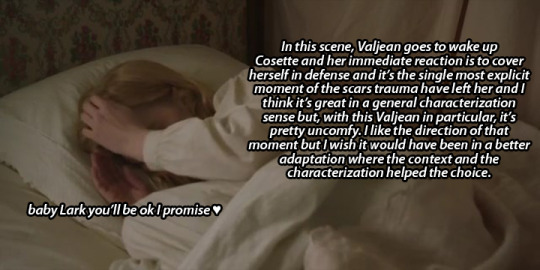
But all that kind of loses its importance when the men around her not only don’t give a shit but also do their worst.
Valjean manhandles her, harms her even, pushes her to the limits of her emotional state by taking her to see the prisoners intentionally after she mentioned prison, acting more possessive than caring and more erratically violent than conflicted and concerned.
Marius has a somewhat wet dream about her and then again dreams with her in confusing ways when he’s out of the barricade, with his grandfather talking about her as if she’s a piece of meat even after he meets her and she’s right in front of him.
They tried to make Cosette more aggressive, I think, more reactive, which in some moments worked. But when the lens in which she’s viewed is objectivizing, when she’s being commented on, offered and treated as an object, then it isn’t enough. It makes it worse, actually.
I’m sorry for Ellie, though, she did good.
3. Éponine
Much like Cosette, Éponine’s childhood was all but a few cameos. It’s very often that adaptations try to “tone down” Éponine in order to pull a narrative of her as an underdog in a love triangle, the “friendzoned” girl who tragically dies. The musical does that, for example.
Some of Éponine’s most controversial actions in the brick tend to be most often deleted or changed, except for adaptations in which she’s an “enemy” to Cosette’s narrative of a classic heroine.
It isn’t easy to find adaptations that are able to make Éponine showcase the complexity of her canon character not as a problem but as what makes her character so good and important in the overall story. Hey, even fandom sometimes tends to romanticize Éponine as if she had to be “redeemed” in order to be seen as a worthy character (but that happens a lot with female characters in general).
Éponine doesn’t exist for Marius’s narrative, as the other girl in a love triangle, or for Cosette’s narrative, as an enemy, she’s her own character with her own reason for existing and complex human dynamics that are extremely permeated by the social circumstances she’s immersed in and represents.
I’d say this adaptation is on the group that uses her for Marius’s storyline.
Added to that, it’s one of the worst I’ve seen on that case, because in this one, Marius is complicit of Éponine’s intentions, which are sexualized to a degree I don’t feel comfortable with.
We’ll talk a bit more about the Marius side of things later, but for Éponine, it meant she was reduced to a character that exists to sexually awaken Marius rather than a tragic figure on her own or even a piece of a love triangle. So, basically, this is the worst I’ve seen in a while.
This is clearly seen in that interview when Davies explained why he added that “wet dream” scene, saying:
“One of the best things Hugo does is to have Eponine tease Marius with her sexiness because he is a bit of a prig. So I have introduced a scene where Marius, even though he is in love with Cosette, has a wet dream about Eponine and feels rather guilty about it. I think it fits into the psychology of the book.” Source
Let’s leave out the part where he considers that to be “one of the best things Hugo does” because I cannot deal with that right now. Let’s focus on the other bit.
Like this quote suggests and I said before, Éponine was rather reduced to a tool for Marius’s sexual awakening. In this version, it isn’t only the “wet dream” which precedes more crucial interactions between Marius and Éponine, there’s also a scene where she strips for him through the hole in the wall and another where Courfeyrac is commenting on her and Azelma as Marius moves into the building for the first time.
By the time Marius gives her his money and any sort of bond can occur, it’s evidently clear in this version that Éponine has been teasing Marius and he is fully aware of it. He looks at her through the peep hole licking his lips and then has that disturbing dream where she’s kind of forcing him onto her in a very questionable way.
So, this Marius is by no means unaware of the fact that Éponine was attracted to him in some capacity and has played along her seduction, which makes his dismissal of her and his request for her to find Cosette a lot like he is using her for his own gain and replacing her for another girl.

Éponine’s attitude, much like Cosette’s, tries to be more active at times. She’s confrontational to her parents, seems protective of Azelma and is pleased to see her mother stuck in jail.
However, much like with Cosette, any kind of agency is compromised for having her narrative be serving a male character’s development rather than her own. Her involvement in the barricade is also somewhat modified but, by that time, her journey has already been substantially affected.
Much like Ellie, Erin was a very good Éponine when she was allowed to perform at her best and I wish she had been involved in an adaptation that was able to portray Éponine with more justice.
I’ll talk a bit more about women on the show in general in problem #3 but, for now, let’s move on.
Problem #2: The portrayal of masculinity
1. Javert
I am not the best person to write an essay on Javert, there are a lot of people more capable than me for that, and I may be called out for this and mess everything up, but I can’t write overall opinions without mentioning my issues with his characterization, at least summarized.
Javert is a complicated character. He is, as much as everyone else, affected by the circumstances and a man who goes through a huge emotional impact and sees his values questioned and compromised. His and Valjean’s journeys have a lot in common, in different ways and with different outcomes.
Sadly, Javert tends to be seen as a villain in a lot of adaptations. It’s a way to simplify the plot in the way movies tend to do: something is defined by what the other isn’t, if Valjean is the protagonist, then Javert must be his antagonist. I was worried that this version was going to fall into that trap, because of time restraint and Davies’s tendencies of simplifying complex characters.
Javert’s characterization was erratic, much like Valjean’s. His attitude was blurred by fits of rage and moments of confusing violence, followed by charged pauses in strange cadences which tended to fluctuate. I don’t think his attitude was as all-over-the-place as Valjean’s, but it was certainly not as well defined as other Javerts I’ve seen through the years.
This Javert, however, had a choice made for him that separates him from other versions:
Over tea in central London, Davies tells me that he was surprised to discover that, in Hugo’s 1862 novel, neither character [Javert or Valjean] mentions any sort of sexual experience, leaving the 82-year-old screenwriter wondering, at least in the case of Javert, whether it was indicative of a latent homosexuality. Source
There is a lot to unpack there.
First, there’s this idea of masculinity in which the lack of explicit heterosexual intercourse in canon is directly representative of homosexuality. I’m not gonna delve a lot in the brick but there are a good bunch of characters you can easily read as gay. Hell, there’s that whole thing going on with comparing Enjolras and Grantaire to greek couples. And if you want to write Javert as gay, go ahead, there’s a lot of fanfiction out there who is with you on that and I’m here for all interpretations, no problem at all.
But if you’re going to take that route, you need to be careful with your optics.
This Javert is, at the end of the day, in this adaptation, a gay man of color. He is also explicitly obsessed with Valjean in a way that exceeds his sense of justice. He looks at him undress in prison, is all over his personal space while he’s in chains and later interrogates him believing Marius is his lover, clearly attempting Valjean to confess to him if he was. He receives a lot of comments from an officer who touches him and looks at him strangely in the last episode, prompting an immediate rejection from him.
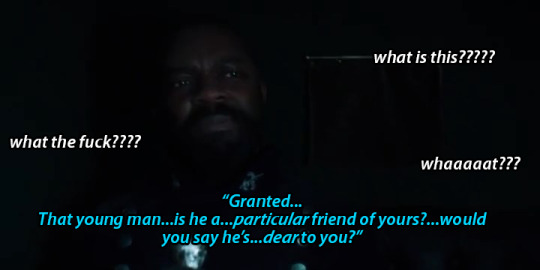
Everything points to Javert’s homosexuality being in the plot only as a further motivator for his need to capture Valjean, which makes for both a problematic portrayal of predatory homosexuality and a subsequent narrative of police abuse, both very problematic aspects to portray through a gay man of color. The way he acts and the way in which people act around him make it seem like his obsession with capturing him is fueled by the fact that Valjean represents his closeted feelings and that is all kinds of messed up.
He is also clearly not as involved in other aspects of the law as he is in capturing Valjean, since Thénardier ends up being a secondary worry to him, even explicitly knowing he has been mistreating and abusing a child, and he also explicitly doesn’t care about his achievements or the ones of his other officers as long as Valjean is on the loose. He lets Thénardier escape prison on his watch and doesn’t take care of it himself, prioritizing Valjean.
It isn’t about what happens in canon or not but in how all of this, in this version, is framed under this idea that Javert is also gay and has an obsession with Valjean that seems predatory in part, rather than fueled by his beliefs. And that is a dangerous optic to write a gay character under. Especially a police officer who is also a man of color.
I’m not the one to talk about that, it’s not my experience to tell and I’m not going to speak over those whose experience this is, but as a content creator, I’d question if my need to diversify is stepping over the lines of problematic aspects that may ill represent the identities I’m trying to integrate. Just saying.
David’s performance hits some very good moments, especially when Javert starts contemplating suicide. That is a very important scene in every adaptation and a very amazing chapter in canon and David does well in performing the turmoil in Javert’s decision. They also add, as a voice in off, the notes he left to improve the service, which is a great touch.
But, much like the other characters I mentioned, his performance is blurred by these writing choices in which Javert has been added this sort of predatory sense in which Valjean in jail symbolizes also keeping his identity hidden away. Davies would probably say his “desires” because that’s the kind of guy he is.
I hope my opinion isn’t overstepping anyone’s voice and I’ll leave the further of this discussion to someone more appropriate, but I felt it was an important matter to include and something we all, as media consumers, must pay attention to.
2. Marius
I had higher hopes for this boy, I really did.
The good thing this adaptation does for Marius is give him a bit more room than others do. They touch more on his relationship with his father and his grandfather, they bring up the Thénardier connection to his dad, they introduce Mabeuf, and they bring him on as a kid in the beginning, which even though questionable in comparison to him having more development as a child than Cosette and Éponine, at least helped to introduce him as another key character of the whole story.
I had hopes that this earlier introduction, albeit unfairly unbalanced with Cosette’s and Éponine’s, would allow for his character to develop more strongly, especially since politics were very present in his conversations with his grandfather and the ideals of his dad. I thought that by introducing politics through Marius that would allow his connection to Les Amis de l’ABC be more profound when the moment for revolution came.
Yeah, no, that didn’t happen.
Les Mis is a book where people are the heart and soul of it. With that in mind, characters aren’t like each other, they aren’t repetitions of the other’s attitude, they are diverse reflections of the complexity of humanity. The portrayal of masculinity in characters like Javert, Valjean, Gavroche or each individual member of Les Amis aren’t the same between each other, and neither are the same as Marius’s.
Marius represents a very wide emotional spectrum. He’s sensitive and vulnerable, passionate and driven, but at the same time can take action into his own hands when he has to and fight, even at the cost of his own life. There are layers in Marius. Like a Rogel cake.
I don’t want to generalize but a problem I have often with older male writers is that they see emotional complexity as weakness, especially when it comes to the portrayal of masculinity. There’s this idea in which something that is undefined or conflicting isn’t “strong” enough and therefore requires forcing.
Remember that quote I brought up for Éponine’s characterization? we’re going back to that. To Davies calling Marius “a prig” in need of being seduced.
Like I said, this version made Marius complicit in Éponine’s advances and aware of her sexually charged intentions, and this was made in an attempt to “upgrade” Marius’s masculinity and make him “less of a prig”. Because in order to be a Man, Marius needs to objectivize women. Apparently.

Like I mentioned, the gesture of Marius giving Éponine the little money he had ended up being a lot less effective by the fact that he had already fantasized about her more than once, and with her knowing that. He is taken to a brothel by Courfeyrac and Grantaire in which women pretty much throw themselves at him while he looks for Cosette. The “wet dream” he has is a very eerie combination of idealization and assault, in which Éponine, taking Cosette’s place, forces him onto her (much like Davies is forcing this onto Marius).
It isn’t about sex or eroticism being introduced to Marius’s storyline, is that they appear forced and almost violently thrust upon him in order to validate him in this idea of masculinity the adaptation seems to have, which seems to be very narrow.
And, with that in mind, we’ll move on to the last bit of this section.
3. Valjean
I am unable to write a piece about how many layers of wrong this Valjean embodied.
There are a lot of good tumblr scholars and Les Mis experts talking about it already, they can explain better than I ever could, but we need to, at least, try to glimpse at the mess this was, because this is a post on problems and this was a major one.
There are a lot of interpretations of Valjean, some of which are astronomically awful. He’s a character that can be easily fucked up, maybe because he also represents a very complex range of emotions, a very wide spectrum of masculinity, and is inserted in a wide variety of social contexts and spheres during his lifetime, which permeate his way of living as well as his agency to do things.
Any adaptation of Les Mis from the get go starts with the challenge of representing all of this in a limited time frame and with a limited perspective. It’s very difficult to translate not only all of this complexity but also all the thoughts the narrator can rely, all the feelings and conflicts and internal turmoil that we can get from the book because it’s written.
The musical, in that sense, has some elements from its medium that help, like the soliloquies, the changes of key, the ability for characters to bear their souls through song without interrupting the believability of the story.
Representing Valjean without a medium that allows a peek inside his head is a big challenge. He is a character whose turmoil is most often interior, so showcasing that externally poses difficulty.
Still, you can’t fuck up this much, my dude.
I’ve seen bad Valjeans in my life, this one is...complicated. He’s not good, don’t get me wrong, but he isn’t as clear-cut godawful as others I’ve seen, he’s too erratic to be easily described.
I think this adaptation tried to showcase complexity through visible emotional distress and physical violence. Instead of having a soliloquy or symbolism, we have Valjean shouting or screaming or burning his hand with a coin and staring at it for a while or shouting at nuns or carrying Cosette by force so hard her arm is in pain.
Everything gets even more confusing when everyone around him treats him weirdly.
You get years of exposition clumsily thrown at you via a speech Fantine hears when she arrives at Montreuil and he’s been elected. You get girls looking at him naughtily and suggesting Fantine to try to seduce him. You get inkeepers and Thénardier suggesting his intentions with child Cosette aren’t appropriate. You get women in dress shops thinking his intentions with young adult Cosette aren’t appropriate. You get Javert thinking his intentions with Marius aren’t appropriate. Everyone wants to talk about Valjean’s sex life or something, I don’t know.
His attitude towards Cosette is also muddled by this erratic behavior and the very strange way in which he sees her and Fantine.
He is visibly more worried about men taking advantage of her, of “defiling” her, than other dangers she could be in, like his identity being found out by the police or her falling in the hands of the Thénardiers again. He forcibly removes her from Marius’s presence and has a fight with her about it that ends on him taking her to see the prisoners. He knows she still, as an adult, visibly flinches when she’s approached harshly yet manhandles her when he wants to keep her locked up.
There’s something possessive about this Valjean that ties in to how Cosette is portrayed as an object. He talks about Cosette as if she was something he needs to keep, says Marius will “rob” her, not because he wants to be a good father or see her happy but because she is his to have.
This Valjean feels as if Cosette was his attempt to get rid of the guilt he feels for having failed Fantine more so than anything else. She’s less of a person and more an object he needs to keep for himself like a third candlestick. That’s the impression I got of their relationship with his characterization.

By the time the series ended, I felt upset with Valjean.
I didn’t care if he died, I didn’t care if he suffered. And that’s pretty shitty for a Les Mis adaptation to prompt. He made me feel uncomfortable, uneasy, as if he was the last person I would trust to take care of a young girl. And whatever internal journey he was going on wasn’t developed well enough to understand any of these choices.
I don’t know, like I said, I’m not an expert of the subject of Jean Valjean, but I’m pretty sure this is not how you adapt him.
Problem #3: Diversity without optics
This show hadn’t even started and it was already patting itself on the back for being diverse.
Now, if you haven’t been in the world of Les Mis for too long, let me tell you there are a lot of adaptations which are diverse, and not only of the musical. In itself, it wasn’t a pioneer move, but I was nonetheless happy that they were going to pay attention to that. At the end of the day, Les Mis is about society, about oppression, and adaptations of it should represent the diversity of the social landscape of the time and place they’re created in.
That being said, diversity in a highly political storyline needs to be carefully worked through, because without optics you can make questionable choices. And, you guessed it, questionable choices were made here.
I can’t and won’t go over all of the issues with this that there are, but I can give a few examples.
There is, of course, the always present argument of casting Fantine and Cosette white and the majority of the Thénardiers and Éponine as poc. And of casting the majority of Les Amis as white and the majority or most visible part of Patron Minette as poc. People have discussed this at length so I won’t go over that.
There is also how constantly woc were cast in roles of service, some of which were questionable given the context. Simplice, for example, is cast this way, which I overlooked at the time but as it kept escalating with other characters like Matelote and eventually Toussaint, it grew a bit more complex.
Toussaint was...a very problematic choice.
When you present the character of a “housekeeper” in a period series which is meant to represent France in the 1800s, and she is a woman of color, some alarms start ringing. I don’t specialize in French history, but my instincts were proven correct when I checked various sources on dates, after seeing the episode, and I’m quoting wiki for easier access here:
Slavery was first abolished by the French Republic in 1794, but Napoleon revoked that decree in 1802. In 1815, the Republic abolished the slave trade but the decree did not come into effect until 1826. France re-abolished slavery in her colonies in 1848 with a general and unconditional emancipation.
This series has a weirdly set timeline in comparison to the book but, for all intents and purposes, we’re in the early 1830s at the time she’s first introduced, correct? There was still an unstable situation regarding abolition at the time. The general emancipation hadn’t been yet stated in the colonies and the decree had just been starting to hold effect.
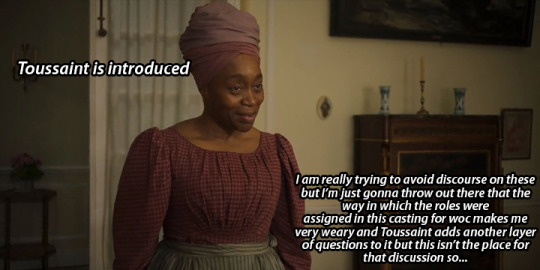
I know this show is casting in a general way as a suspension of disbelief of some historical facts and I’m all for diversity in casting in period dramas, regardless of anything else, if it’s allowing for representation in media.
But, at the same time, you need to be careful with your optics. She could have been cast as anyone else.
I don’t wanna go over this a lot because I don’t know enough about these parts of French history nor is it my story to tell, but the problem is in the erasure of conflicts or racism altogether as a way to prompt a shallow sense of diversity in a story that is directly linked with the subject of oppression.
Let’s continue with another similar optics problem involving “diversity” to exemplify this issue further, so that I can clarify.
This barricade had women on it and didn’t have Combeferre.
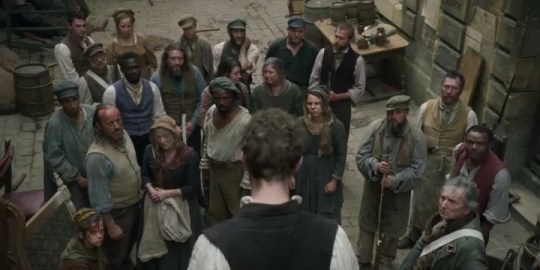
Now, here is the thing about that. In the barricade my man Combeferre gives an amazing speech about women and children.
In case you weren’t aware, the 1800s were the moment when European women and children barely started to be seen as separate members of society and not only “men but worse” and “men but small”. There are a lot of good articles about that, including one by Martyn Lyons about the new readers of the 19th Century, which changed the course of the editorial market, those being women, children and working class men, who didn’t have access to literature or literacy before that. The idea of childhood as we know it started then, and the later editions of the Grimm fairy tales was one of the first published books of fairy tales explicitly aimed at children’s education. And since a lot of us, in other places of the world that aren’t Europe, were colonized af or barely getting free from colonial governments in the 1800s, we kinda had to go with the flow, regardless of the social structure of native peoples, because colonialism sucks.
But you all came here for Les Mis so, let’s get back to that.
As this terrible and summarized dive into history implies, women and children were vulnerable to the fucked up state of social strife. Education was scarce and only accessible to some, employment was scarce and only accessible to some, food was scarce and only accessible to some. Most often than not, “some” did not include women and children.
In comes the the sun to my moon, Combeferre, with his speech.
He talks about all of this. Basically he talks to men who are the main providers of families, providers of women and children who depend on them and goes (I’ll paraphrase) “it’s our fault as a society that women can’t be here now, it’s our fault they don’t have the same possibilities and education we do, so at least do them a solid and don’t die today here if they depend on you to live, because the only possibility they have without your support is prostitution”. It was a fucking power move to include that on Les Mis. I mean, the entire book is a call out to the social and political situation, but damn.
So yes, there aren’t women there but the reason for it is that patriarchy sucks and the consequences would be disastrous for them.
Davies & co. pretty much didn’t give a shit about this. But, at this point, considering Problem #1, who’s surprised.
They removed Combeferre, his speech and placed random women on the barricade, as if nothing of that was going on and the patriarchy didn’t exist. Because ~diversity~.
The fact that they thought more woke to put some random women there on the barricade to die fighting instead of acknowledging the existence of sexism altogether pretty much sums up what this whole show thought diversity was.
For them, diversity wasn’t a political and social standpoint born from reality, a way to represent the dynamics of oppression that are at stake even on this day, but an aesthetic.
And, talking about speeches, let’s move on to the next bit.
Problem #4: Where are the politics?
1. The social and political landscape
Les Mis adaptations have a fluctuating balance with politics and social conflicts.
That is, at the end of the day, the very core of the existence of this story, the reason why still, to this very day, it is relevant and quoted, adapted and regarded is the fact that we still need it.
All of us, as human beings living as members of society, are always immersed in political decisions. It’s not only unavoidable, it’s part of our lives as people living together.
In the same way, the personal narratives of the characters of Les Mis are intrinsically linked to this landscape. They are set in different places of the social spectrum and hold different power dynamics and actions that relate to political standpoints.
Adaptations tend to work this in very different ways.
Some focus less on the politics and more on the social strife, with a greater focus on the characters. Others re-insert the characters in other different historical moments with the same levels of social and political strife. Others just copy-paste the situations and put them in another context, without really explaining what revolution it is, what they’re fighting for and why they’re being killed. The focus varies.
It seems, for how this adaptation starts, with Waterloo and a subsequent argument between Gillenormand and Baron Pontmercy about Napoleon, that politics are going to be important. This doesn’t last very long.
My biggest issue with the introduction of these circumstances is that they don’t bother on them but then attempt to use them for gratuitous self righteousness. It isn’t that they abandon them altogether, they overlook them but then attempt to use them for shock value.
There is a constant use of exaggerated, almost cartoon-y, stagings of social depiction:
- You have Gillenormand dining with his boys, in a luxurious and incredibly flamboyant scenery, while dissing political views in an almost comical fashion
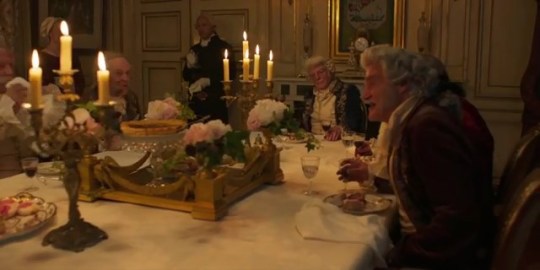
- You have beggars downright assaulting Valjean and Cosette on the street right outside the convent, as a means of shock to Cosette’s expectations of the world outside of it
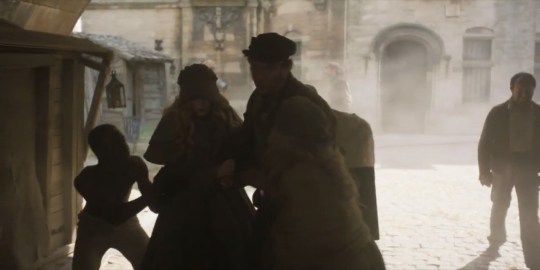
- You have Fantine’s entire sequences as a prostitute with higher and higher degrees of abuse
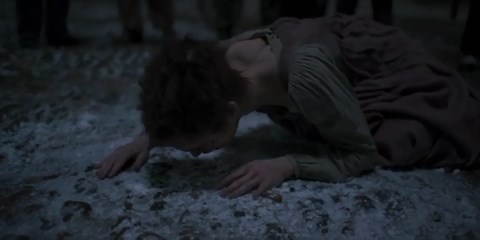
- You have the streets before the barricades, in some sort of confusing clamor that loses focus in favor of Valjean’s storyline
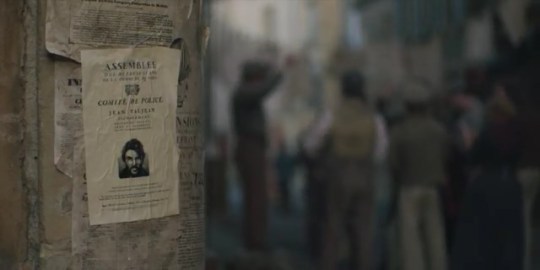
- You have a god awful last scene which attempts to say something socially compromising by showcasing the kids Gavroche was helping (I don’t think they’re siblings in this version), as a means to say “the revolution wasn’t successful and social strife will always continue” I guess, I don’t know, because it’s not like they gave a shit about it all before, so this kind of Perrault-ish moral of the story at the end makes no goddamn sense
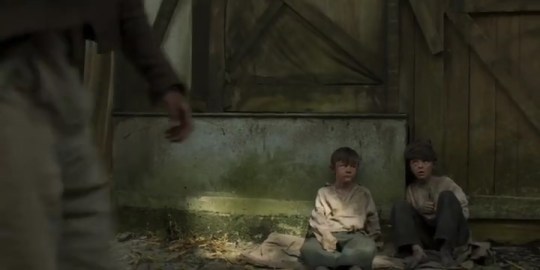
They are exaggerated snippets of things without context, with very little exposition, that are used more as props to shock than they are to actually take a stand on what the original story is trying to tell.
Even the reality Fantine has to suffer is blurred by the fact that the social situation isn’t seen as much as a reality in itself but a combination of Fantine’s “choices” and Valjean’s “guilt”.
But, in order to delve more into the non-political aspect of this adaptation, let’s focus on some specific characters.
2. Enjolras
Well, I’ve seen a lot of Enjolrai in my life (is that be the plural of Enjolras? yes? no? can it be?).
Enjolras has very different characterizations, even within fandom itself, but we can all agree that he’s a) highly political, b) highly committed to the cause and c) extremely charismatic.
And when I say “charismatic” I mean it in the sense that his speeches are so beautifully crafted, so certain and commanding, that you just wanna listen to what he has to say, regardless of your views. They’re political discourse but also very poetic, which is a very interesting literary opposite to Grantaire’s voice, but I digress.
Still, Enjolras doesn’t stand on his own.
He represents a part of a whole, an important part, but a part nonetheless. Les Amis are a very diverse mixture of individuals, and the main triumvirate represents different stances on the same political action that coexist together.
Without others to stand with, Enjolras loses context. Not because he can’t support himself as a character, but because his biggest value is within other people.
This Enjolras is confusing, angry and loses a lot of steam when most of the people who should be around him aren’t really paying attention.
Courfeyrac, although performed really well, doesn’t really get a chance to show his political ideas without Enjolras around, and that makes it seem like he’s being convinced to participate rather than doing it for his own reasons and being one key part of the group.

In the barricade, Enjolras acts as if he doesn’t know what he’s doing half the time, and the other half he doesn’t give a shit about killing soldiers, smiling and laughing while shooting people.

It isn’t just that the scene with Le Cabuc doesn’t exist, Enjolras doesn’t seem to have empathy, which is all given to Grantaire instead.
By taking away Enjolras’s vulnerability, his complexity, they make him seem more shallow overall, and in tow, make his cause lose importance.
And without a clear political standpoint, because his expositions about the situation are very shout-y and unclear, and his speeches are summarized with some actual quotes but without their meaning and true feeling, he seems to be fighting just because, rather than having strong ideals.
Enjolras in the brick is eloquent enough, humane enough, that you understand what he’s doing and why. This Enjolras is a mess that I couldn’t understand at all.
I don’t think people who have never seen, read or heard of Les Mis before will understand Enjolras as a character through this. He’s just a very angry student with weird facial hair (why?) who rants in a cafe while his friends are playing games and making jokes, who is friends with some workers and is the leader because he shouts the loudest but doesn’t seem to know what he’s doing.
And, worst of all, doesn’t seem to care for human life. Which brings me to the next bit...
3. Grantaire
Man, was I excited with this casting choice.
When I heard Turlough was playing Grantaire, I was delighted. And, at the end of the day, his performance was very good, but for a character who wasn’t quite Grantaire at times.
I mean, he wasn’t as off as Enjolras, but he was also so erratically written.
They decided to make Grantaire hesitant rather than a cynic. He didn’t get to express his cynicism or his attachment to his friends (what friends though? only Bossuet had a name other than Courfeyrac and Enjolras) and his involvement with the fight was shown as insecure rather than questioning of ideals.
He is shown conflicted when he decides to fight with them, he doesn’t have any of his long speeches, the Barrière du Maine scene or anything of the sort. He is just...hesitant about death, I guess. About dying and killing people. That’s his conflict.
This has, to me, two big problems attached to it.
First, it’s a simplification of the entirety of Grantaire’s thoughts. It’s taking the cornucopia of drunken philosophy that Grantaire’s voice in the brick represents and replacing it with a single fear, which while very valid doesn’t reflect Grantaire’s true extensive complexities.
Second, it takes away from Enjolras’s humanity. Enjolras is showcased as an indiscriminate machine of shooting soldiers while Grantaire is conflicted about having to do this and, in tow, makes Enjolras’s rejection of him when he leaves and gets drunk like a jerk move of an insensitive asshole.
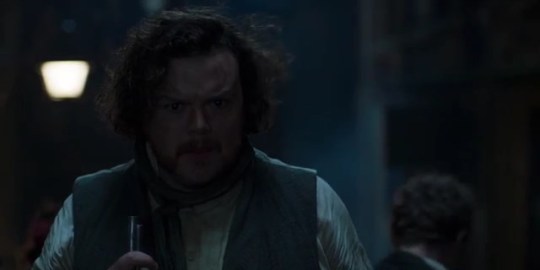
There isn’t a clear instance of Enjolras giving Grantaire a chance to do something before the barricade and Grantaire failing at it, with all the dominoes symbolism and all the stuff it implies. There isn’t a complementary set of complexities between each other. Grantaire seems to care about human life more than Enjolras does in this version, at the end of the day, because Enjolras’s speeches, even if carrying canon quotes, are inserted in a context in which he laughs while shooting people, knowingly sends Gavroche into danger and chastises Grantaire for being conflicted about human lives at stake.
So, instead of representing Grantaire’s true complexity as a character, they chose to give him something else that they think makes him more dimensional, when, in reality, takes away from his (and Enjolras’s) worth as a character.
All of this is very weirdly intersected with drunken jokes. Sometimes, the jokes and the behavior pays off and is inserted in good moments, sometimes they just don’t know when to stop and they kind of ruin their death scene with them, which is even worse considering it’s one of the few where they’re actually holding hands.
Overall, I think this was a simplification of Grantaire, in a way, a simplification which falls apart without a solid context to exist in. And it’s a pity, because Turlough was good.
4. Gavroche
The only reason I’d want an immediate new adaptation of Les Mis is so we can cast this same Gavroche in a decent one. He’s one of the best Gavroches I’ve ever seen, hands down.
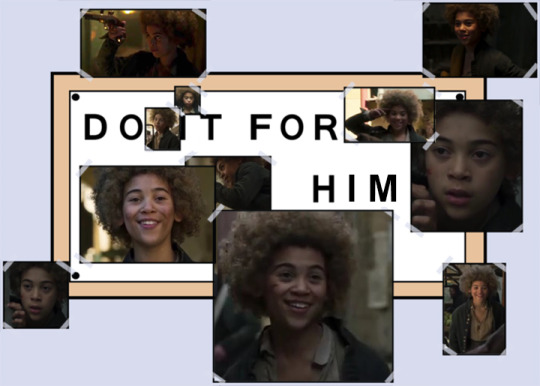
In this case, the problem isn’t with his interpretation or how he was written, necessarily, and all time frame and socio-political simplifications aside, the problem is in how the context reacts to him.
A lot of Gavroche’s agency is deleted in this version.
For starters, his age is kind of all over the place at the beginning. He’s fine by the time of the barricade, but before it’s kind of a mess. As a result, he lives with his parents for a bit longer than necessary and the few times we see him on his own, being his independent self, are in conflict with how his involvement in the main events come to happen.
It feels as if he’s been used in the barricade. When he’s off to find bullets, only Marius tries to get him back to safety, while the rest cheer him and laugh.
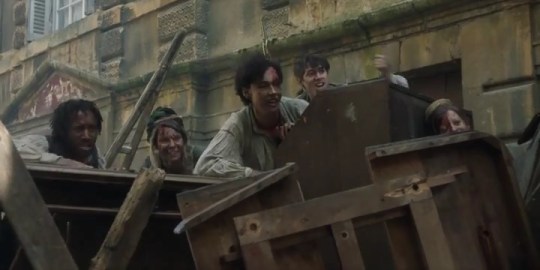
His character is well performed and we get to see his personality and his situation when he’s allowed to act on his own, but within the context he’s inserted in, he seems more like a prop than a character.
This makes it so that when he dies, you’re upset more so than sad. It doesn’t feel like a tragic circumstance born out of a lot of layers of social strife which culminate in a dead end for a kid who deserved a better life. It feels like every adult around him, every person he encounters, either neglects him, mistreats him or sends him into danger. It feels, much like with Fantine, like an easily avoidable situation.
And things get worse with this guy:
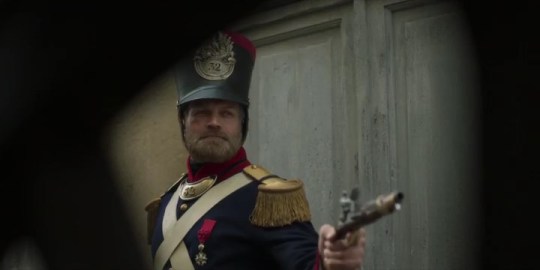
Like I said in my summary, this David Harbour-ish soldier is the one who is shown to mercilessly kill both Gavroche and execute Enjolras and Grantaire.

This is another layer in the modus operandi of an adaptation who uses social oppression and political strife as shock value rather than commentary and discourse.
By personalizing “evil” in one stern, mean, unreasonable, power-hungry soldier, they’re villanizing (and trivializing) the social context as a whole. It isn’t about how Gavroche got to that point, how we as a society failed so hard that he has to die in that way. It’s just one bad guy.
But then, they try to be fake deep about it, by doing that last scene with his brothers or by placing him alongside Mabeuf and Éponine but not explaining what that means, why those juxtapositions are socially relevant and important to the plot (maybe they don’t know why).


Overall, this was such a waste of a great Gavroche that I just feel really bad. Reece deserved so much better.
5. The barricade
Needless to say, this barricade was more of a mess than you would have expected.
The lack of proper introduction to the political landscape, the clumsy exposition, the out of context shout-y speeches and the erratic behavior of its characters, paired together with the fact that it ends about 1/4 into the last episode, giving more time to personal drama than any of what happens in it, makes it one confusing mess.
It’s also in the barricade where it’s super clear how visually similar this series is to the 2012 movie. A lot of visual choices are extremely similar, even when they didn’t need to be (Fantine’s and Cosette’s hair choices? the shots in the hulks? the scaled down yet very similar camera angles and movements during the entire fight? the color schemes of some particular scenes?), and it’s pretty heightened in this barricade.
Which I wouldn’t care about hadn’t they talked crap about the movie during their entire PR campaign.
Like I said, there were so many issues within the people involved in the barricade. With the women, with the characters, with the soldiers. There was also a very strangely set line between workers and students that they were very clumsy about setting yet didn’t get to do much aside from having the leader of the working class men leave when Enjolras prompted it.
By the way, Enjolras was a lot less convinced about the whole ordeal in this version, which made his characterization even more confusing.
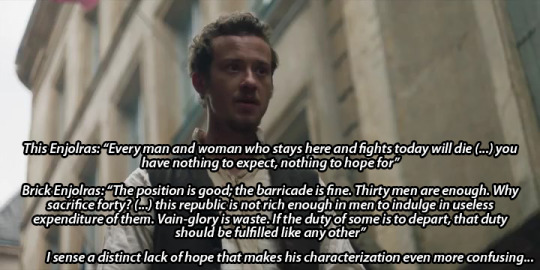
The barricade had a lot of messed up ingredients and not enough time to even simmer. At least the musical, which doesn’t have a lot of time dedicated to the students either, has Drink With Me, which doesn’t only serve as a way to characterize different students and their beliefs and personalities (“Is your life just one more lie?”) but also brings some melancholic change of pace, a pause between the action.
The highlight of this barricade, though, is Marius going apeshit with the torch.

But, all in all, there’s no much we can expect from a barricade born of confused ideas and even more confusing characterizations. This barricade feels less like a climax and more like a thing they had to do because it was in the book.
And don’t even make me talk about how they butchered my favorite speech. I’d rather not have it there at all, tbh.
Conclusion: A writer’s ego
We arrive to the end of this long and boring trip through my thoughts. If you’re reached this point, thank you for your time.
All in all, I feel like a lot of the issues of this adaptation stem from the fact that Davies thinks he’s better than everyone else and other men around him agree so much that they let him do as he pleases, without questioning anything.
I can’t really understand how you’re going through the script of this and see some of these choices (like the dress shop scene, the carriage scene and let’s not even mention the peeing in the park scene) and you go, and I’m quoting Shankland here:
“Andrew’s scripts made these characters feel modern. That was nothing to do with having them speak in a very modern way or changing their behaviour, he just found the humanity and earthiness of it,” Shankland says, recalling a scene in which Fantine and her companions urinate in a Paris park. “I thought, ‘Oh god, they’re going to pee in Les Misérables, that’s exciting.’” Source
That just sums it all up, doesn’t it?
After I watched this, I let some time pass. I watched all 3 fanmade adaptations that are currently out at this moment (back to back), revisited some of the ones I had seen before, read fics, read people’s articles and rants, looked into other adaptations on stage, from the classic ones to the more interpretative versions, and other current tv adaptations being done in other countries.
All of those things are vastly different. Some are more similar to each other, some are widely different, but they’re all different points of view on the same canon.
This is a canon that has some of the wildest possible interpretations coexisting. You can have a play centered on one specific character told through the songs of a specific album, a tv drama in modern times with a lawyer Valjean, a coffee shop au starring Les Amis, a parody comedy set in 1832, all happening at the same exact time.
And that’s great. That’s fascinating. That means this book is still alive because we need it still today.
Some days you’re in the mood for a heavily political adaptation which gives you goosebumps for setting canon in a context that is closer to your everyday reality, other days you just want all the Amis to live and have movie marathons cuddled together. It’s all valid.
But what all of those adaptations have in common is that they aren’t trying to be more than they are. They aren’t acting brand new, they aren’t pretending they’re re-inventing the wheel or that they are smarter than Victor Hugo himself because what Hugo didn’t know he needed in the “psychology of the book” was a soulmate au or a documentary series.
This adaptation, through what they said and how it was written, acted as if it was going to be the ultimate Les Mis adaptation to end them all. It presented itself as smarter than us all, as holding the keys to the meaning of Victor Hugo’s thoughts, as being able to fix his “mistakes”, fix other adaptation’s “mistakes” and deliver the best interpretation of canon possible.
And it managed to be a sexist, socially insensitive, problematic, un-political, homophobic mess.
Which, is a problem in itself, but even more so when the canon you’re adapting should be, first and foremost, against all that. It isn’t about how many brick quotes you use, it’s about channeling the soul of the story.
#les mis#les miserables#les mis bbc#les mis bbc a summary#jean valjean#cosette#fantine#eponine#marius pontmercy#enjolras#grantaire#gavroche#death cw#long post when expanded#luly rambles#bbc les mis
50 notes
·
View notes
Text
The Big Problems With OUAT’s Writing:
My favorite characters were Rumple, Belle, Emma, and Nealfire. Once Nealfire got killed off though, their characterizations and their relationships, as well as everyone else’s thereafter, went to total shit in canon. Adam and Eddy obviously couldn’t come up with any more than two-and-a-half seasons of organic or satisfying character growth for the original main cast, and it should have ended in 3x11, in my opinion. I’m pretty sure that Damon Lindlelof helped them out with the writing a lot for the first two-and-a-half seasons, which is why the story is at least coherent enough to be enjoyable up to 3x11.
But after 3A, Lindlelof’s plans for the show were butchered, Kitsowitz completely took over the show with Captain Fuckboy, PLOT, and making money their main focuses, so they kept it on air for the next four-and-a-half seasons not knowing what else to do now that they had run out of new story. Thus, it got to the point where it essentially devolved into such badly written crack!fic soap opera on screen by the end of 5A where the writing for everyone’s characterization had become so unbelievably OOC, annoyingly self-contradictory, changeable, hypocritical, illogical, melodramatically problematic, and toxic in favor of the PLOT that I had to quit to preserve my sanity.
I enjoyed reading Rumbelle fanfic moreso than the actual show because it made sense and felt more satisfying, well-written, in-character, and entertaining than the nonsensical toxic garbage the show had devolved into.
After 5A, Eddy Kitsis said in an interview that he thought “good storytelling” was making sure the audience goes “WTF? This makes absolutely no sense! This isn’t fair! This totally contradicts everything that I was shown before, and feels too stupid, too contrived, and too OOC to even believe possible.”
It wasn’t worth getting emotionally or mentally invested in this show or any of the remaining characters as written in canon anymore post 3A because A&E and these writers formula kept becoming more and more of “We’re doing our jobs if we can trick our audience after deliberately teasing them by dangling the carrot of organic growth of character that we’re too lazy to follow through on by yanking it away from them as soon as they start making logical predictions abruptly, cruelly and inorganically with constant twist of ’HOLY SHIT, CAN YOU BELIEVE THAT JUST HAPPENED?”
When Eddy basically said that at the end of 5A, I realized I was done with having any hope for this show, and I decided to finally quit watching after 5B because I knew every time something started to seem to make sense and go in a direction of organic growth for the characters, A&E and these writers would deliberately pull the rug out from under them and their audience for trying to get invested in them with some inorganic contrivance that ruined everything in an unfair way that made no sense and never would make any sense in canon from what we were led to believe would happen beforehand on this show by them because that was the whole point: A&E and these writers so often didn’t want you to make sense of their show because they were lazy hacks who didn’t know how to write a cohesive plot or organic character growth/realistic characterization after 3A.
They admitted that they liked whiplashing their audience for using common sense and logic in regards to fans whenever the story and the characters would seem to be potentially headed in a way that would make sense. They considered that “genuis” storytelling with their overinflated egos, rather than just very cruel, mean, lazy, and low bad writing that ultimately destroyed most of their main characters’ credibility and their fans willingness to stay emotionally invested in their canon show that the creators/writers refused to let unfold organically in a way that made consistent sense long term.
Instead, they used a constant series of contrived magical macguffins and twists of “WTF just happened? This makes no damned sense from what was just previously established on screen, and does not at all relate to it! This is unbelievably absurd! The characters would never do or say this shit in real life!”
It destroyed the credibility of most of their characters’ in canon and their fans willingness to stay emotionally invested in their show, and it was insulting, especially when you had showrunners like Eddy Kitsis admitting to the fans “As always with this show, once the audience gets onto what we’re doing, we have to change it.”
When they said “We hope things will be ‘fun’” for the character assassinating, wildly OOC, nonsensical, and melodramatic garbage writing of 6A for Rumbelle with the Morfetus bs twist or in 5A of the Dark Swan arc, they didn’t mean that we would necessarily be legitimately entertained as an audience when they threw in a character destroying inorganic magical contrivance or bizarre twist out of nowhere that forced the characters into weird directions that made no sense from what had been previously established.
Adam and Eddy meant that they would be having fun pissing those of us in their audience off by insulting our intelligence and common sense by constantly giving us inorganic contrivance of OOC characterizations, magical macguffins, and bizarre PLOT twists and contrivances that didn’t consistently, logically, and thus satisfyingly add up with what had been previously established, rather than entertaining us with organic character growth that made satisfactory sense by letting our predictions for characters come true in their sheer laziness to slow down and write organic character development.
There were even hints of this problem before 3B-S7 that I was seeing potential for in 2B. OUAT could have gone strong for longer than two to three ish seasons if A&E and these writers had slowed down from 2B, not gotten obsessed with Hook, not gone to Neverland, and not gotten so obsessed with the next big, bizarre, and contrived magical PLOT twist or macguffin that, oftentimes inorganically forced their characters to 180 regress in ways that made no sense for moments of “HOLY SHIT! WTF JUST HAPPENED?”
I have no problem with characters regressing when it’s done organically, slowly, relatably, and realistically. The problem with OUAT was that they used inorganic contrivances to push them back-and-forth between increasingly bizarre extremes that made no sense, rather than focusing on human or realistic motivations to get them from point A to point C organically. It felt fake, and it felt forced. I know it was fiction, but it felt like lazily badly written fiction when the characters swung back-and-forth by the writers playing God with them on the strings of their asinine PLOT twists inorganically.
It had gotten beyond exhausting trying to invest in a show run by petty hacks who were never going to allow their audience’s common sense and intelligence lead them through an organic path of growth for these characters with the writers dangling the carrot in front of them for a story that actually could make sense, and then abruptly, cruelly, and inorganically yanking it away from them with an absurd twist because they were too lazy to come up with any more ideas for organic character growth after 3A.
Let’s talk about Hook and CS becoming such a main focus on this show, and the romantic male lead/couple.” It’s not that Hook couldn’t have been organically developed into a sympathetic character worthy of redemption in his own right. A&E couldn’t write that, though. He also didn’t fit together with the ensemble main cast in the place of Nealfire as Emma’s main love interest. He and Emma had absolutely no chemistry. Hook’s sudden interest in her was bizarre and creepy.
Then, they killed off Nealfire through absurd means for Hook to take his place in the picture where he didn’t fit in the family circle, so they could have CS. They broke their own rules to bring Rumple back from the dead to turn him into the wildly OOC on-and-off-again “big bad” scapegoat cartoonish villain PLOT twister “foil” to Hook, even after having been given two-and-a-half seasons of the most well-written and well-earned sympathetic reforming anti-villain/tragic hero backstory and redemption arc from S1-3A. They destroyed Emma’s, Belle’s, Snow’s, David’s, and even Henry’s original sympathetic characterizations by obliterating their self-respect, intelligence, self-awareness, and moral integrity, so that they could inorganically force this bullshit narrative of Hook/CS being the “best hero” ever in a world of now meaningless, shallow, and simplistic black versus white hypocritical morality that Nealfire and the common goal of family balanced out with a sense of realism, common sense, organic growth and emotional depth that got lost with his death in favor of contradictory character destroying magical PLOT-twist driven Drama™️ soap opera “hero versus villain” fuckery and Hook/CS.
No wonder they lost more and more viewers as every season passed...Getting emotionally invested was no fun when the writers deliberately pulled the rug out from underneath your favorite characters whenever things started to seem making sense by totally ruining it with some bizarre magical contrivance or characterization that doesn’t add up to what we were shown before, and your logical predictions for stories that made organic and consistent sense for character growth were mocked by these writers because they refused to slow down and develop the characters after S1-3A. You were punished for being smart and using common sense, and that’s why most of these main characters’ credibility and integrity got completely destroyed in one way or another by this very lazy, petty and unfair bad writing technique of theirs that made them mostly feel like pod!people after just the first two-and-a-half seasons of the series.
tldr; You could only suspend your disbelief by turning off your brain to disregard the bullshit writing choices on OUAT and just blindly enjoy the show by getting invested in the characters for so long as written in canon without asking any questions before the writing became too infuriatingly repetitive, too contrived, too OOC, too character assassinating, and too stupid to believe. Also, Captain Fuckboy ruined the show after 3A, and he should have died and stayed dead back in early S2. It could have been different if A&E were good writers who could come up with organic character growth, and not shoehorned him in as Emma’s love interest in a way that ruined the whole show’s dynamic and sense of emotional depth by replacing Nealfire with him.
Nealfire’s death was the metaphorical death of the show’s canon, though. My personal headcanon was that the real show ended with “Going Home” (3x11) because that’s the last time there was any sort of compelling, consistent, organic, realistic, or relatable characterization or growth. After that, it all went to hell (literally), and I had to finally quit watching after S5 to preserve my sanity before anything got any worse, and on this show, it only would because A&E and these writers never learned.
A&E didn’t trust or respect their audience, so after awhile it felt like why should I respect their shitshow’s canon if it doesn’t make any consistent or well-developed sense, and they don’t care that it doesn’t themselves anymore either?
#anti ouat#anti kitsowitz#anti ouat writers#anti ouat 3b s7#anti hook#anti cs#rumplestiltskin#belle#nealfire#emma swan#swanfire#rumbelle#snow white/mary margaret#prince david/david nolan#snowing#henry mills#I think trying to watch this show after 3A started eating away my brain cells with its sheer ridiculousness!#Mindfucking your audience with bizarre and stupid ass contrived twists is NOT good storytelling!#You don’t punish your audience by changing the plot out of nowhere just because your audience uses logic to predict where it could go#because your fragile egos and lazy asses are too lazy to write organic character development#since you’d have to slow down and do something NEW then instead of recycling the same old storyline by going back to the status quo#and fans would recognize that your creator pets/self-insert ship suck anyway#You don’t outright destroy sideline and/or kill off other characters/ships because they could be competition#for the characters/ships YOU want your general audience to like as a creator/writer of a work of fiction#because you’re too fucking lazy to actually organically develop Hook as a likable individual character!#That’s so fucking petty and unprofessional!#I’m NEVER going to watch another movie or show with A&E’s or ANY of these writers names attached to it EVER AGAIN!#I’m so bitter about how much they abused and misused their main characters for PLOT fuckery and Hook/CS ESPECIALLY the Goldstiltskin family#I’m pretty certain Lindlelof outlined most of S1-3A for them. It’s probably why 3B-S7 feels so ooc cheesy shallow repetitive and stupid
32 notes
·
View notes
Text
Еssеntіаl Оіls - Тhе Ніddеn Dаngеrs Fоr Wеll-Меаnіng Аnіmаl Lоvеrs
As Aromatherapy is ending up being more widely accepted in the mainstream, more people are utilizing essential oils on their own, at home. Sadly, as some people are discovering, this is not always having a favorable affect on the animals in their lives.
There have actually been numerous reports of animals hurt, even passing away, from essential oils. Tea Tree Melaleuca alternifolia, has actually gotten a bad rap recently, mostly likely originating from that it is so commonly readily available. Well indicating owners have actually utilized this oil to treat skin-related conditions such as bites and scratches, only to wind up at the veterinarians workplace with an animal exhibiting indications of toxicity, such as ataxia, incoordination, weak point, tremblings, vomiting or anxiety.
Misinformation is a massive issue in this area as well. As an increasing amount of people rely on a more natural method at life, companies are jumping to money in. Thousands of items consist of vital oils in their components; pet products are no different. The average person, unaware of the threats, can easily believe these products would be completely safe when in fact they are not.
Pennyroyal (Hedeoma pulegioides), for instance, is extensively utilized as flea control. This oil is a recognized abortifacient in people, and thought about a toin to the liver and the kidneys. Νot eactly a strong selling point, although it is excellent at keeping fleas at bay!
Many products for felines likewise include vital oils. Unfortunately, for the felines, numerous feline owners are unaware that by using these products, they can slowly cause toxins to build up in the feline's system, triggering a sluggish beginning of organ failure. A cat's liver cannot process toxins as a human's or perhaps a dog's can, and the chemical constituents of the oils, such as terpenes, phenols, and ketones, are no exception. he results of these can be immediate in showing up, or can take years.
Birds are well known for being delicate to scents and particles in the air, and vital oils are no different. Gillian Willis, a toxicologist in Vancouver, has actually seen many cases of bird poisoning, consisting of a well-meaning cockatiel owner who, upon seeing an abrasion on her bird's foot, applied a drop of Tea Tree oil. The bird became depressed and even with veterinary intervention, died within 24 Hr of breathing failure. Even diffusing oils around a bird can produce dire consequences.
Νot all is lost:
While this might all seem intimidating to an animal enthusiast who likewise enjoys the benefits of aromatics, all is certainly not lost. A little knowledge can go a long method while including important oils around your animals.
Choosing necessary oils:
Purity can be a problem when it pertains to necessary oils. For example, it takes approximately one hundred pounds of plant product to produce one pound of Lavender Lavandula angustifolia. Due to the expense, numerous essential oils are watered down in other compounds. These can vary from carrier oils, such as jojoba, to artificial fragrance, even chemicals. When you are picking essential oils to use therapeutically on your own and your pets, you desire only the purest readily available. To determine this, there are a couple of essential things to search for:
-EO’s need to not be oily or leave an oily residue. - Packaging should consist of the common name (Lavender), the Latin binomial (Lavandula angustifolia), the native land, the technique of distillation, the part of the plant used, lot number, amount of oil in bottle, contact information of the business, how the plant was grown, and the words "100% pure necessary oil" R the components, if in a carrier or blend. - Price typically determines quality. - Νot all bottles of the same size yet of various oils ought to be priced the same. In other words, if they bring 50 various kinds of oils, yet every 5ml bottle is $7.40, there is something wrong, and you can guarantee these oils have been adulterated in some method.
Using quality oils in houses with pets:
Once you have your essential oils and are pleased with the quality, the task ends up being using them correctly. While they can be extremely restorative and valuable, they can likewise do harm. Remember, just because a product is natural, does not suggest it is safe.
There are some important oils that need to never ever be used for animals: Anise, love Leaf/Bud, Garlic, Horseradish, Juniper, Thyme, Wintergreen, or Yarrow, to name a few.
Some that can be used consist of: Cedarwood Atlas, Chamomile, Eucalyptus, Ginger, Lavender, Myrrh, Ravensare, Rose, And Valerian. (Νote that these lists are not exhaustive and further research study from the pet owner must be done).
For dogs, necessary oils can be utilized in a range of methods, from bathing to relaxing the nerves through diffusion. Some indicate remember:
- Pets cannot tell you what is or is not working. s such, you must closely enjoy their responses. Excessive scratching, smelling, nervousness or whining are all signs to expect. - Always water down the oils. A typical appropriate dilution is 25% of the adult human formula. - Offering vital oils internally is not typically recommended. - Do not use any oils on medium-large breed pups under 8 weeks, and little or toy breeds under 10 weeks. Hydrosols are a better choice. - Slowly present the oils. - What benefits a big canine is ΝOT great for a lap dog. Size matters, and less is absolutely more when dealing with oils, for animals or people. - Sick, frail, older, or pregnant canines have unique factors to consider, Just as in people. Do not administer the very same dosage to them as you would to a healthy animal of the same size. - Νever usage oils near the eyes, mouth, nose, or genital location.
Felines are especially sensitive, as previously mentioned. Even distributing oils in the air or utilizing them as cleaning agents around your home can be detrimental. Make sure that the feline has a method to enter into another room, with fresh air to 'leave'. Oils must never ever be used topically since of their liver's inability to process them. Hydrosols, likewise known as hydrolats or flower water, are a much more secure alternative with many of the very same advantages. For smaller animals, such as hamsters, guinea pigs, and rabbits, hydrosols are likewise the very best choice, at a 50% dilution of what is utilized for felines.
Birds need to never ever be exposed to oils, whether topically or in the air due to their extreme level of sensitivity. Hydrosols can be used, but in very minute amounts, just like in natural remedies.
Fish cannot tolerate oils or flower waters. he oils, not being water-soluble, would wind up sticking to the fish, causing a host of problems, up to and often times consisting of, death. Hydrosols each have their own pH levels, and have the possibility of ruining the pH levels within the tank, also triggering damage to the fish.
An animal lover's best bet, for the sake of their family pet, would be to educate themselves even further. One needs to be cautioned about searching the internet, however, as false information is everywhere. Be sure to inspect the credentials of the author before following the advice of any website. There are a few good books on the subject, one of my favorites, and the reference for this short article, is Holistic Aromatherapy for Animals by Κristen Leigh Bell. With a little love and research study, aromatherapy can be highly useful to human beings and animals alike!
Hopewing- great oils and blends
pure oregano oil
lavender essential oil
hh frankincense
0 notes